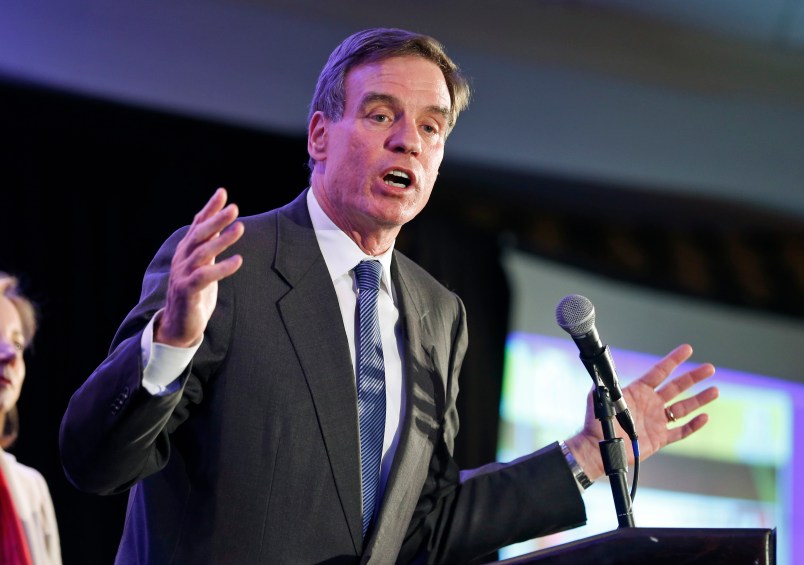There were times on Tuesday when it appeared that Republican Ed Gillespie maybe — just maybe — could defeat Sen. Mark Warner (D-VA) in what would be one of the bigger upsets of the midterm elections. On Wednesday, though Warner seemed to clearly be the winner as he led by 12,000 votes and felt confident in this lead that he could declare victory even though the race still had not been officially called.
But the lingering question remained: How did Warner, who has been deemed one of the safest incumbent Senate Democrats, survive by such a thin margin?
Warner, after all, had a money advantage, incumbency, and polling all going his way. Gillespie, by contrast, had a candidacy still seen by some as a dry run for a gubernatorial run down the line. Analysis of the race is still coming in but the early signs suggest that the fact that Warner seemed like a shoe-in for re-election is what really made him, ironically, less of a sure thing.
“They weren’t really doing voter mobilization in Virginia because Democrats put this race off the radar screen. I know Republicans are going to say ‘eh! if we’d put more money in we would have run the race,'” University of Florida political science professor Michael P. McDonald, who previously taught at Virginia’s George Mason University, told TPM on Wednesday. “But at the same time the Democrats would have too so it’s not entirely clear because you don’t know what the Democrats were going to do.”
What the results show is that Democrats did not turn out as well as one would have expected in deep blue parts of the state and that’s likely because Warner seemed like he would coast to an easy victory. That’s especially dangerous for a Democratic incumbent in a midterm election that happened to also be intersecting with the sixth year of a two-term president (which usually is a time when seats are lost for the party that controls the White House).
“The Democrats clearly needed to work harder in Virginia than they did. The natural advantages that Democrats have in urban areas are only advantages if they get the kind of turnout that can compensate the Republican advantages in more rural parts of the state,” University of Mary Washington political science professor Stephen Farnsworth told TPM. “You’re looking at an underperformance in Northern Virginia in particular by the Warner people, compared to even the governor’s race last year.”
Farnsworth pointed to the margins of Democratic strongholds in the state like Fairfax and Loudoun counties where, he said, “you see that that performance didn’t measure up.”
“This is always a problem, by the way, for Democrats in Northern Virginia. Because they live in a Democratic area they often forget how conservative the rest of Virginia is and it takes a great deal of coaxing to convince people to participate in midterm elections and that’s doubly true in Norther Virginia,” Farnsworth added.
Because Warner’s margin of victory is so small, the prospect of Gillespie requesting a recount has come up. The Warner campaign held a conference call featuring elections attorney Marc Elias, who said there is no chance of a recount. Incoming provisional ballots or the double checking votes could flip the margin of victory from Warner to Gillespie.
“There is really no precedence for a lead of this magnitude changing over the course of this process or any recount process that Mr. Gillespie might consider. The margin here is close but it’s not small,” Elias said. “This is a close election but it is not a small lead. It is a sizable lead. We’re talking about 12,000 ballots and if you look at the results of the last few Virginia elections or other Senate elections you’ll see that we are not talking about the kinds of razor thin margins that lead to prolonged post-election efforts.”
Warner officials have not responded to questions by TPM about the tight margin of victory for the senator and whether it was what they expected it to be.







Another race that should haven’t been close.
Agreed for the people that wanted change they wanted to vote for the guy who was the chair of George Bush Jr’s campaign? Enron lobbyist?
How many low information voters know that that is what they did?
I don’t understand why none of the pollsters picked up on Gillespie’s strength? I follow Nate Silver and Sam Wang and many others and no one saw this coming. It is like the polling before Eric Cantor’s defeat. Why does it seem that polling and analysing Virginia is so difficult?
Its easy…most democrats are tired of these “no labels”, “third way” type of republican lite candidates. They also didnt feel motivated to get out and support them.
I can only speak personally but I am tired of democrats just accepting republican positions on a variety of issues. If I wanted republican positions I’d vote for one…democrats are having an identity crisis and they’ve got 2 years to sort it out